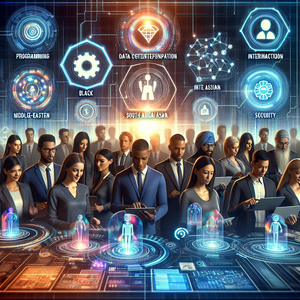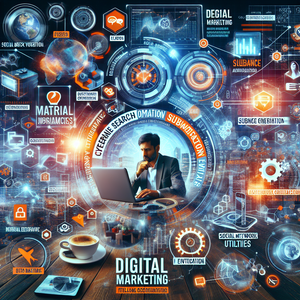
Mastering the Five Digital Literacy Skills: Unlocking 15 Careers Shaped by Technology
In today’s rapidly evolving digital landscape, mastering digital literacy is no longer optional—it’s essential. From education to the workplace and everyday life, technology shapes how we communicate, create, and solve problems. As digital tools become more advanced, the ability to adapt and thrive in this environment hinges on developing a core set of digital skills. These skills are: critical thinking, effective online communication, content creation, information evaluation, and ethical use of technology. These competencies are more than buzzwords; they are the building blocks of success in the 21st century. Whether you’re a student preparing for a tech-driven future or a professional navigating the demands of your career, these skills empower you to innovate, collaborate, and stay ahead of the curve. This article explores each of these five digital literacy skills in depth and reveals 15 careers where they are not just useful but critical. By understanding how these skills shape the modern workforce, you’ll gain insights into how you can develop them to unlock new opportunities in today’s technology-centric world. Let’s dive in.
Job Summaries:
Critical Thinking:
- The ability to analyze, interpret, and evaluate digital information to determine its accuracy, relevance, and reliability.
- It helps you make informed decisions in a world flooded with data and misinformation.
Effective Online Communication:
- Communicating clearly and purposefully across digital platforms
- Utilizing email, social media, video conferencing, or collaborative tools
- Building relationships in a connected world
- Sharing ideas effectively
Content Creation:
- The ability to create engaging and impactful digital content—such as blogs, videos, graphics, or presentations—tailored to specific audiences.
- It also includes knowing how to use design and editing tools effectively.
Information Evaluation:
- Assessing the quality, authenticity, and value of online information.
- With so much content at our fingertips, this skill ensures you can filter out noise and focus on credible sources.
Ethical Use of Technology:
- Navigating the digital world responsibly
- Respecting privacy
- Avoiding plagiarism
- Practicing cybersecurity
- Adhering to ethical standards in technology use
Digital Literacy Educator:
- Teaching others how to navigate the digital world responsibly is the backbone of this role.
- Educators might help students assess the credibility of online sources.
- Educators might train employees to recognize phishing scams.
Instructional Designer:
- Designing an interactive online course for a company’s onboarding process
- Integrating videos, quizzes, and simulations to engage learners
- Ensuring the content is both accessible and effective
IT Trainer:
- An IT trainer might teach employees how to use enterprise software securely, emphasizing cybersecurity best practices while troubleshooting common technical issues.
Social Media Manager:
- A social media manager for a nonprofit organization could craft compelling posts about their mission.
- Use analytics to measure engagement.
- Adjust strategies to reach a wider audience.
Cybersecurity Analyst:
- These professionals analyze system vulnerabilities and respond to cyber threats, ensuring that data breaches are prevented and ethical technology practices are upheld.
Digital Content Strategist:
- A strategist might lead a campaign for a retail brand
- Creating targeted content based on customer data to boost sales
- Ensuring the messaging aligns with ethical advertising standards
E-Learning Specialist:
- Designing an online module for university students, complete with interactive videos and assessment tools, demonstrates the growing demand for digital learning solutions.
Data Analyst:
- A data analyst might interpret sales trends for a retail company.
- They use visuals like graphs and dashboards to present findings.
- Their work can guide strategic decisions.
Digital Marketing Specialist:
- Developing an email campaign for a product launch
- Analyzing click-through rates
- Refining messaging based on audience behavior
Web Developer:
- A web developer might design a user-friendly e-commerce site while ensuring data security and compliance with accessibility standards.
UX/UI Designer:
- Crafting an intuitive app interface involves balancing creativity, user testing, and technical know-how to deliver a seamless digital experience.
Online Community Manager:
- Moderating a forum for a gaming community
- Ensuring respectful interactions
- Organizing virtual events
SEO Specialist:
- By optimizing a blog for search engines, an SEO specialist ensures it ranks higher on Google, helping businesses attract the right audience.
Digital Transformation Consultant:
- A consultant might help a company transition to cloud-based tools, streamlining operations while addressing concerns about data privacy.
Virtual Reality Developer:
- Building a VR training program for surgeons
- Combining immersive realism with ethical considerations such as patient confidentiality
- Showcases the cutting edge of this field
Mastering digital literacy is more than a career advantage—it’s a necessity in today’s interconnected world. By embracing these five skills, you can open the door to a range of exciting opportunities and thrive in an era defined by innovation and technology.
Explore More Jobs

